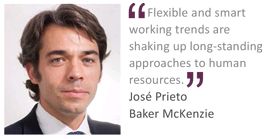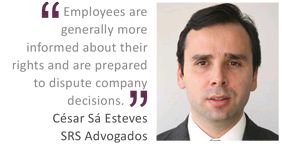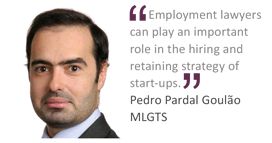Employment lawyers are benefitting from a rise in M&A transactions in Iberia as well as a rise in litigation – meanwhile, the start-up sector and the 'gig economy' are also generating opportunities
The improving economic climate in Iberia has led to an increase in instructions for employment lawyers – a significant rise in M&A activity in particular, has led to a wealth of work related to incentive schemes and management contracts, for example. Meanwhile, employment-related litigation is also widespread with an abundance of disputes related to the collective dismissals and changes to employment conditions associated with corporate restructuring. In addition, employment lawyers also highlight the significant number of instructions generated by the start-up sector as well as the 'gig economy'. At the same time, clients will require legal advice associated with issues such as human trafficking and workplace harassment.

In Spain, economy minister Luis de Guindos' prediction that "the unemployment rate this year will clearly fall below 17 per cent" proved correct. In a country still notorious for its high rates of unemployment, the percentage of people out of work in Spain clocked in at 16.38 per cent in the third quarter of 2017, down from 17.22 per cent in the second quarter. Meanwhile, in Portugal, the third quarter saw the unemployment rate fall to 8.5 per cent, which is lower than the Eurozone average.
Pilar Menor, country managing partner at DLA Piper in Spain, says the increase in work for the country's employment lawyers has correlated with the improving economic conditions – for example, companies that had previously been reluctant to make decisions about recruitment during the severe economic crisis are now displaying more confidence. According to Jordi Puigbó, partner at Cuatrecasas in Spain, a more buoyant job market is good news for lawyers. "Employment lawyers thrive when employment itself does," he explains.
Lawyers highlight the uptick in M&A transactions as a significant driver of employment-related instructions in the last 12 months. Indeed, there was somewhat of a resurgence in M&A in Iberia in the first half of 2017 – for example, Mergermarket data shows that by the middle of June this year, the total value of Spanish M&A deals had almost equaled the total for the whole of 2016 (there had been 135 deals worth a total of €46.7 billion, slightly less than the €48 billion of deals announced by the end of 2016). Mario Barros, partner at Uría Menéndez in Spain, says: "Employment work related to M&A transactions – including due diligence, management contracts and incentive schemes, for example – has also increased." Araoz & Rueda associate Clara Mañoso says M&A transactions are generating "many opportunities" for employment lawyers. She adds: "Clients needs have changed since the financial crisis – they are investing in imaginative ways to create, attract and retain talent (such as benefit/incentive plans, for example), as well as focusing on maintaining stable workforces to build a team of workers who are committed and prepared to continue working hard."

Collective dismissals
Aside from M&A-related matters, employment litigation is another major source of work for law firms. Barros claims that, while restructuring work (including collective dismissals and changes to employment conditions) is in decline, such matters are giving rise to significant amounts of litigation.
While there is fierce competition among law firms when it comes to fees, there are reasons for optimism, in part because the start-up sector is generating plenty of opportunities for lawyers in Iberia - Barcelona, Madrid and Lisbon are becoming increasingly attractive as locations for start-ups seeking a city in which to establish themselves. Such businesses have the potential for quick growth in terms of employee numbers as well as often requiring new types of employment contract that are tailored to their particular needs.
However, though start-ups are often credited with the drive towards flexibility and innovation in the workplace, such objectives are also shared by larger companies too, according to Barros. "There has been a small revolution in how people work," he argues. "The line between professional and private life is being blurred by flexibility at work and telecommuting." This, he notes, has impacted traditional employment approaches, and brings with it new issues and challenges. These challenges include the need for businesses to rethink the way they engage employees. José Prieto, partner at Baker McKenzie in Spain says: "Flexible and smart working trends are shaking up long-standing approaches to human resources at many companies that endeavour to innovate, attract talent and position themselves as a great place to work."
The so-called "gig economy" is another trend employers – and employment lawyers – have to come to terms with. Menor says that among the new trends deriving from the gig economy that lawyers must adapt to are the hiring of individuals whose status amounts to something in between the traditional employee and the freelancer. Menor adds that this will be a "challenge not only for employment lawyers but also for our courts".

While technology and digitalisation bring benefits to employers and businesses, the culture of being constantly connected can have detrimental consequences for workers. "The right to disconnect may also be an issue on the agenda in the coming years," Menor says. "France is already dealing with this type of issue, and trade unions in Spain may start to introduce this topic in collective bargaining negotiations."
The responsibility for bringing in new employment-related work is largely shouldered by partners in law firms, according to Puigbó. He adds that lawyers "have progressively undertaken to attract clients as a vital part of their job – they have become more and more active in the pursuit of that goal by partaking in a larger number of forums, as well as working their way through the media into the public eye and, of course, increasing their presentations to clients."
In Portugal, while the quantity of employment-related instructions has maintained the same level, the nature of the work has altered. "The high demand for employment-related work remains the same, but lawyers are now busier with different types of work," says Pedro Pardal Goulão, partner at MLGTS in Portugal. As the level of unemployment slowly decreases in the country, the changing market dynamic ensures a steady flow of work, albeit of a different nature to previous years when restructuring work was prevalent. Pardal Goulão adds that, the economic recovery in Portugal has resulted in an increase in both domestic and foreign investment – such transactions are generating a range of opportunities for employment lawyers, including "due diligence, negotiation of representations and warranties, fulfilling of information and consultation duties towards employees or post-completion personnel restructuring."

Know your rights
According to César Sá Esteves, partner and head of the employment and social security department at SRS Advogados in Portugal, there has been an increase in employment-related litigation partly due to the fact that employees are "generally more informed about their rights and are prepared to dispute company decisions". Meanwhile, changes in procedure have "made it easier for employees to bring claims, while there has been a decrease in statutory compensation payments," Sá Esteves adds.
Though there is an abundance of employment-related legal work, the issue of fees is still an important factor when clients make their choice of legal adviser for employment matters. Sá Esteves remarks: "Cost has become an actual part of the service equation and is for many clients the sole deal-maker or breaker in relationships with lawyers." The question of fees also impacts on clients' decisions about which work should be outsourced and which is retained internally, as some organisations brought their human resources functions in-house in order to lower legal costs during the crisis years, lawyers say.
Pardal Goulão says that, from an employment perspective, start-ups "require a whole new mind-set – employment lawyers can play an important role in the hiring and retaining strategy of these companies, as well as advising on the most adequate and innovative contractual solutions to their emerging business activities."
The need for employees to be connected, while at the same time having the right to disconnect, is also expected to generate some significant legal issues. Marta Afonso Pereira, counsel and head of employment at Linklaters in Portugal, says this requires the ability to perform a complex balancing act. "Technology has already changed the way we work substantially, but on the other hand there is also the issue of the right to rest, a matter which is currently on the agenda of the political parties who form the current government," she explains. "How will we manage to balance these issues in the future, with technology that enables us to be connected '24/7' when at the same time we want the ability to disconnect?"
International standards on issues such as forced labour and human trafficking are other key issues which companies must navigate, according to Prieto. "As companies worldwide face rising pressure to comply with international labour and human rights standards, these scenarios cause great concern among corporate leaders, and for good reason," he adds.
Workplace harassment is another issue employers have to tackle. Given the heightened awareness and scrutiny of harassment in every area of life, including at work, Pardal Goulão says the "prevention and banning of workplace harassment will certainly be in the spotlight for the coming year".
The content of this article is intended to provide a general guide to the subject matter. Specialist advice should be sought about your specific circumstances.
